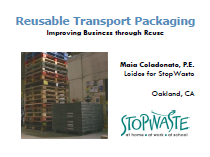Industrial Packaging Prevention and Reuse Project
Learn about other climate showcase communities.
Alameda County, California
- Project Summary
- Community Characteristics
- Results
- Lessons Learned
- Sustainability/ Replication
- Project Websites
The Alameda County Waste Management Authority (StopWaste.Org) launched a project to reduce the use of limited-use transport packing materials (such as wooden pallets and cardboard boxes) by helping businesses convert to sustainable and reusable alternatives. Reducing the use of disposable transport packing materials can reduce solid waste and GHG emissions. The project is developing a highly transferrable program model for local governments and businesses that can be replicated to achieve substantial solid waste and GHG reductions.
The project has been administered by StopWaste.Org along with the Reusable Packaging Association (RPA) as a primary program partner. A team of StopWaste.Org staff is working directly with San Francisco Bay Area businesses and their supply chains to help them transition to more resource-efficient and cost-effective reusable transport packing alternatives. The steps in the process include targeted business outreach and education, a minimum of six training workshops for participants, assistance with implementation planning for interested businesses with a team of supply chain logistics experts, financial modeling assistance for businesses using StopWaste.Org’s "Reusables Cost Comparison Calculator," promotion of the concept of reusables with upper management parties, on-site technical assistance for businesses, and continuous follow-up with businesses after transitioning to reusable transport packing alternatives.
The project has many benefits, including reduced GHG emissions from raw materials, production, transport, and landfilling of packaging. Businesses in Alameda County transitioning to reusable transport packaging are reducing vehicle miles traveled, increasing their economic competitiveness, supporting existing communities, and leveraging federal investment in the area.
The Use Reusables program helps businesses integrate reusable transport packing materials into their operations. With the help of EPA’s Climate Showcase Communities (CSC) grant funds, what started as a regional initiative by a local government agency has gone nationwide over the project span and is continuing beyond the four-year grant funding period. The program team participated in a number of presentations and workshops to encourage interest in the program and continues to follow up with past workshop attendees. The team partnered with North Central Texas Council of Governments, a CSC partner, to produce a training workshop in northern Texas, and also collaborated with Sustain Dane, a CSC partner in Wisconsin, to implement a regional training workshop. The team made progress drafting tools for project implementation, including a grant application, decision flowchart, cost-benefit analysis calculators, and case studies. The team also updated the Use Reusables website, developed a 30-second video, and initiated a six-week Google AdWords campaign to direct traffic to the website. The campaign promotes the reduction and elimination of single and limited use transport packaging materials, and the use of a total of approximately 4,199 tons of materials.
Annual reductions of greenhouse gases (GHGs) amounted to 2,246 MTCO2e, and 28 businesses were transitioned to reusable transport packing materials. This campaign is “sustainable” in that it can be easily replicated nationwide and has long-lasting effects beyond just the duration of the grant. During the four-year period of the CSC grant, the campaign reached an estimated 930 people from over 600 organizations in over 30 U.S. states, Puerto Rico, and Canada. The project received EPA’s Seeds of Change Award in 2014 for its wide-reaching, replicable impacts.
Population: 1,491,482
Area: 737.57 square miles
Government Type: County
Community Type: Urban/Suburban
Median household income: $68,863
|
Final Results |
Projected Cumulative Results |
|
|---|---|---|
|
Annual GHG Reductions |
2,246 mt CO2e |
3,200 mt CO2e |
|
# of Businesses Reached |
28 |
10 |
|
# of Training Workshops |
16 |
9 |
|
Materials Recycled Annually (tons) |
840 |
-- |
- Start with smaller, simpler projects, then build on successes—it is easier to tackle the low hanging fruit first, and although small projects may not individually have a large impact, teams are able to complete more small-scale projects. Additionally, completing smaller projects builds the program’s reputation and provides proof of concept to some organizations that are unable to expand their use of Renewables right away. These companies may implement additional projects on their own following the success of the initial project.
- Adapt outreach strategies and materials to meet the needs of the audience—this project found that shortening webinars and workshops allowed more interested parties to participate, and also allowed the program to follow up with attendees.
- Partners’ roles may change throughout the course of the grant.
- Be aware that behavior change can be complex and slow—this projected tried to meet prospective participants where they are, and participants can be in many different phases of understanding. It is important to remember that the needs of each prospective participant are very different, ranging from the types and quantities of material they use to the type of industry. Stakeholders and decision makers need to be on the same page and it can be difficult to align everyone’s goals while staying aware of budget, vendor selection, changes to logistics and processes, etc. A company’s culture and leadership play a significant role in the Reusables adoption process.
- Not all industries see Reusables as the norm yet.
- Grants helped overcome financial barriers and accelerate implementation. Grant funds allowed the project to reach a wider audience of potential participants, and also allowed the project team to gather measurement information and push for implementation by certain dates.
- Forming partnerships is an important step in establishing credibility and trust.
- In time, the project will create lasting change and achieve ongoing GHG reductions that will extend beyond the grant, build sustained capacity within local agencies to address upstream GHG emissions, increase worker safety, link GHG reductions with environmental and economic co-benefits, and create a model of success that is broadly replicable.
- StopWaste’s work on the Use Reusables campaign will continue in Alameda County.

